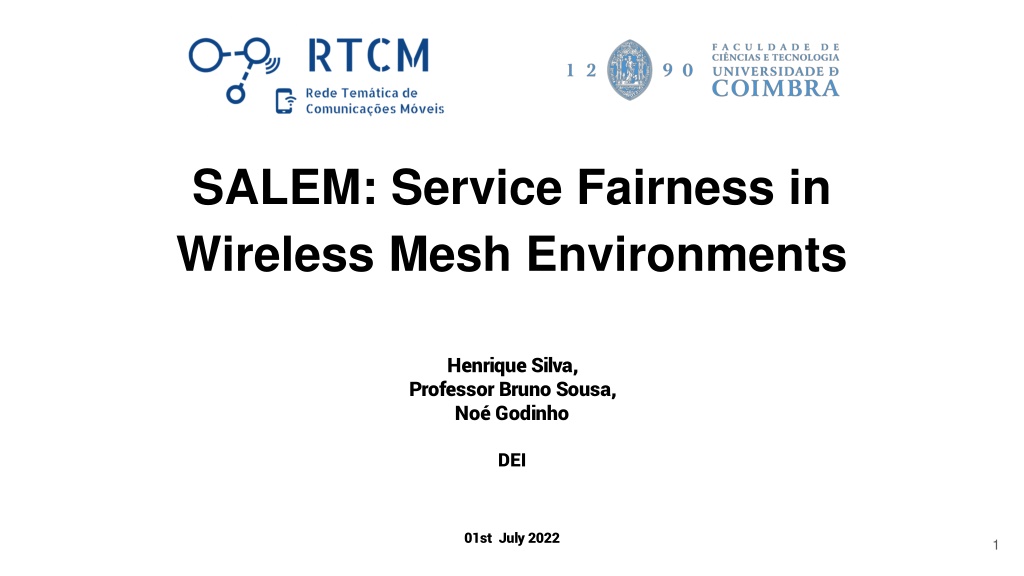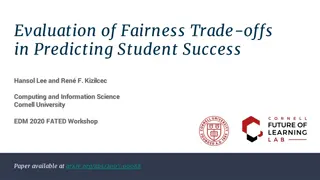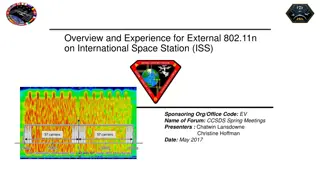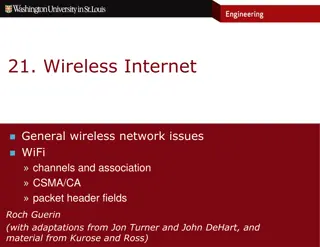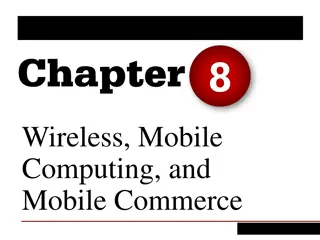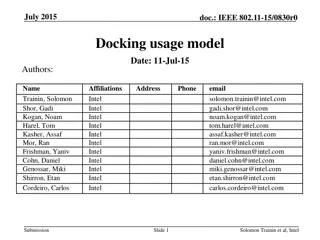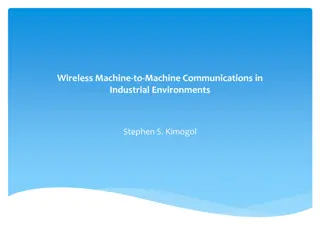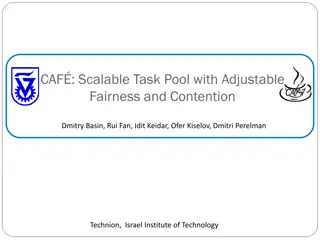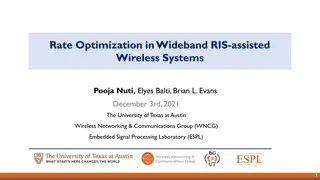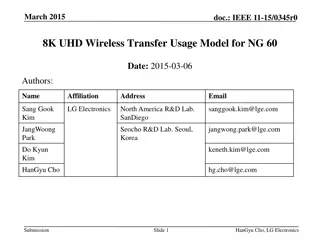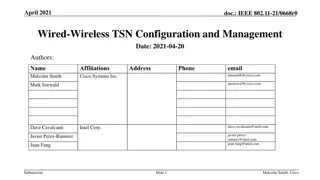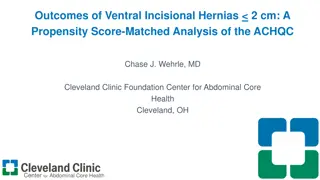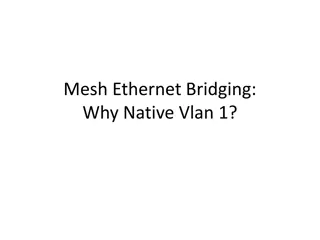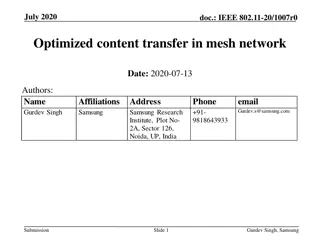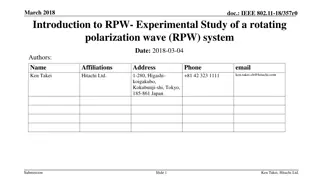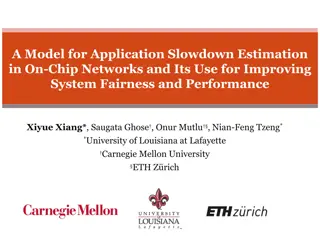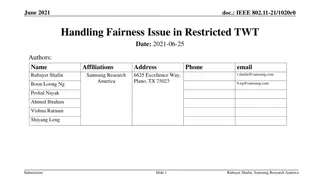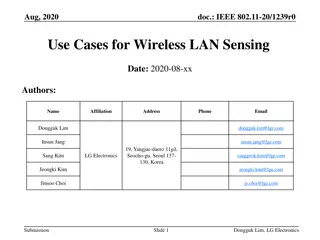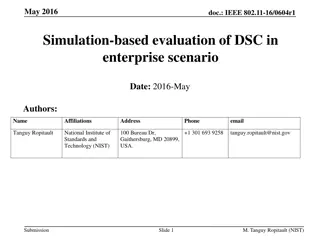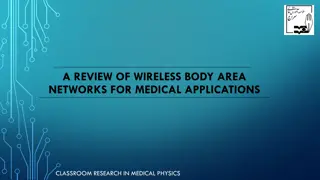SALEM: Service Fairness in Wireless Mesh Environments
"SALEM project focuses on managing resources intelligently in Wireless Mesh Networks to ensure fairness among services with heterogeneous technologies. Implementing a fairness model incorporating delay, reliability, and energy objectives, SALEM is tested in smart city scenarios. Through MILP optimization and ONOS controller implementation, SALEM strives to achieve optimal service sets. The network topology emulation using Mininet-Wifi provides a realistic testbed for evaluating SALEM's performance."
Download Presentation

Please find below an Image/Link to download the presentation.
The content on the website is provided AS IS for your information and personal use only. It may not be sold, licensed, or shared on other websites without obtaining consent from the author. Download presentation by click this link. If you encounter any issues during the download, it is possible that the publisher has removed the file from their server.
E N D
Presentation Transcript
SALEM: Service Fairness in Wireless Mesh Environments Henrique Silva, Professor Bruno Sousa, No Godinho DEI 01st July 2022 1
Contents 1. Motivation 2. SALEM 3. Formulation & Heuristic 4. Implementation & Topology Emulation 5. Experimental Setup & Evaluation 2
Motivation 1. Heterogeneity of services and requirements - Migration of services to the cloud and emerging new use cases changed what network need to comply/handle. Wireless Mesh Networks (WSN) can help but there is still a need to manage resource, nodes usage intelligently fairly 1. Limited mechanisms - Go beyond the traditional equal distribution of resources to manage services & Start taking advantage of the SDN paradigm 1. Limitations of Openflow (OF) - Research and develop a mechanism to work around the limitations of OF in wireless scenarios (e.g. wireless channel selection, interference, mitigation, mobility management) 1. Aveiro Tech City Living Lab (ATCLL) - Take advantage of our prior knowledge of the ATCLL 3
SALEM Objective 1. An approach to support fairness in Wireless Mesh Networks (WSN) with heterogeneous technologies and computational settings, and managed through SDN controllers 1. Introduces a fairness model taking into account three objectives to address the routing issue in WSN: fairness of delay, fairness of reliability and fairness of energy 1. Business logic implemented as an ONOS controller application 1. Tested against ATCLL and similar smart-citie scenarios 4
Fairness Optimization SALEM includes a Mixed Integer Linear Programming (MILP) formulation to determine the optimal sets as a tri-objective multicommodity problem, where each service corresponds to a commodity and each link has a capacity (bandwidth) constraint 5
Implementation Built on-top of the ONOS controller Uses the JGraphT Java library CapacityScalingMinimumCostFlow Collects information of the topology (e.g. layout, loss, flows) Detects a new flow (corresponding to a new service) Runs the heuristic Installs flow rules accordingly 6 Test against emulated scenarios [Mininet/Mininet Wifi]
Topology Emulation - Mininet Wifi Using Mininet-Wifi A centralised backbone SDN switch, Openflow capable 6 clusters of devices with 6 AP each (36 total APs) Each cluster has a SDN switch connecting APs Each AP has wired connections with 10Gbps Fibber optics Each AP has IEEE 802.11ax, 2.4GHz wireless connections 176 meter AP range (output of Friis link budget equation ) 1 7 1) https://www.allaboutcircuits.com/technical-articles/wireless-range/
Problems with Mininet Wifi Wireless connections reporting unwanted losses in traffic simulations Trouble parsing ARP requests in mesh environments; Interference between access points Opting to use wired links (with host or TCLink) cause mesh disconnection Couldn t trust the environment, it wasn t deterministic Result Shift back to Mininet while simulating the conditions necessary to evaluate the fairness characteristics of the mechanism Openflow enabled devices and hosts, adjustable link loss rates, bandwidth and delays, and flexible workload of traffic for different services 8
Topology Emulation - Mininet Using Mininet Replace APs with Switches Replace Stations with Hosts Uses the TCLink class Has only wired connections Switch to switch have 54Mbps and 1.2% loss Switch to hosts have 54Mbps and lossless Remaining links have 1Gbps and lossless 1 9 1) Moreira, M. J. (2020) yawmd: multiple medium support and performance improvements for wmediumd [Master s thesis, FCUP]
Experimental Setup & Evaluation 1. Communications inside the cluster (Intra)-formulation vs heuristic how good the solution is / how close the solution is to the perfect scenario 2. Communications between clusters (Inter)-record metrics and compare against off the shelf ONOS algorithms 10
Questions? Henrique Silva, Professor Bruno Sousa, No Godinho 01st July 2022 11
